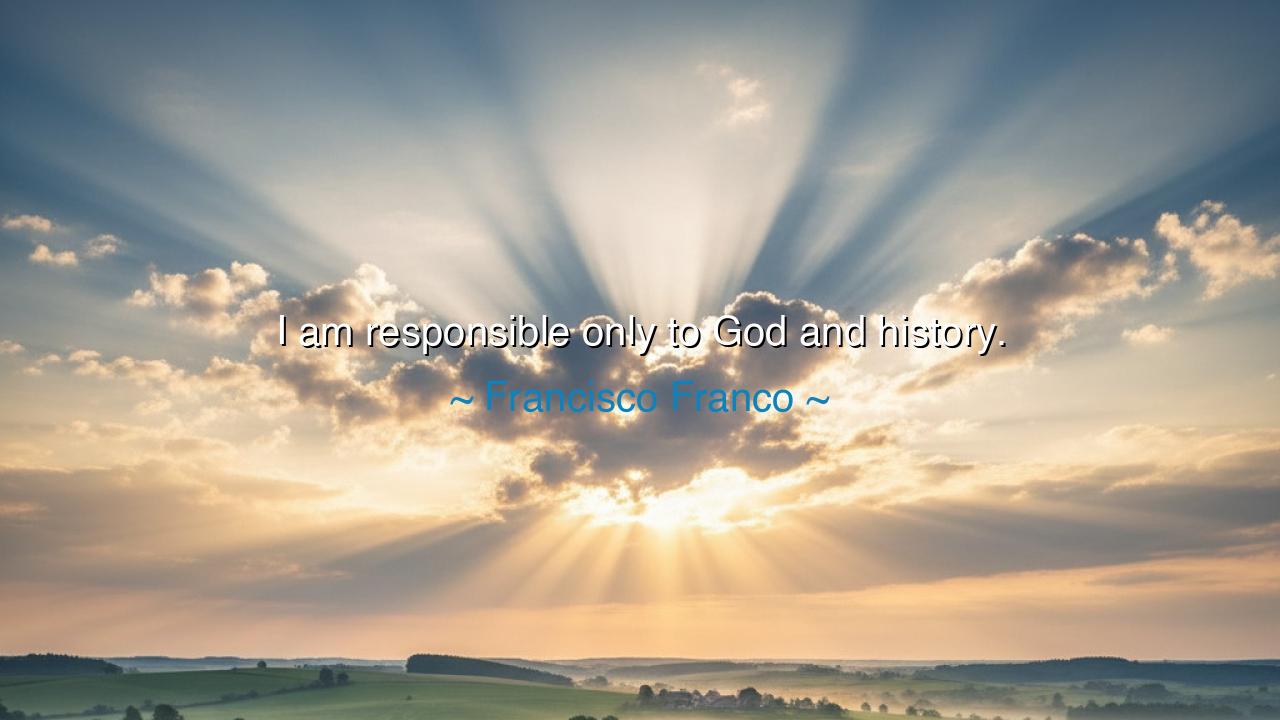
I am responsible only to God and history.






“I am responsible only to God and history.” — Thus spoke Francisco Franco, a man who wrapped power in the language of destiny, who sought to justify his rule not to mortals, but to the eternal. His words are both a shield and a mirror: a shield against the judgment of men, and a mirror reflecting the ancient struggle between authority and accountability, between divine right and human conscience. In this single sentence, one can hear the echo of kings, prophets, and conquerors — those who claimed that their deeds were sanctified by heaven and vindicated by time.
To say one is responsible only to God is to rise above the courts of man and place one’s fate in the hands of the unseen. It is a declaration of moral solitude, of a ruler who answers to no earthly tribunal. Yet such words carry both grandeur and peril. They may spring from conviction — the belief that one’s mission is ordained by the divine — or from pride, the deadliest of all illusions. For when a man says he serves only God, he risks forgetting that God often speaks through the cries of the people. And when he claims history will judge him, he forgets that history is written not by the heavens, but by the hands of those who live, suffer, and remember.
Franco’s Spain was born in blood and silence. In the ruins of civil war, he saw himself as the savior of a broken nation, chosen by providence to restore order. He believed his actions, however harsh, would be vindicated by the judgment of history. But history is not merciful; it does not bend to the desires of rulers. It weighs deeds against consequences, and though time may dull the sword of vengeance, it sharpens the quill of remembrance. The name of Franco stands not only for the man who rebuilt, but for the one who silenced voices — poets like Federico García Lorca, whose light was extinguished by the shadow of tyranny. Thus, even as Franco spoke of responsibility to God and history, both would, in their own ways, speak back to him.
Yet the meaning of this quote transcends the man who uttered it. It speaks to the timeless truth that leadership is a sacred burden. To govern is to stand before the judgment of the divine and the scrutiny of time. Every choice echoes beyond the present moment. Whether king or commoner, every soul must one day face what it has created — for history remembers, and conscience does not forget. The ancient emperors of Rome, the pharaohs of Egypt, the mandarins of China — all sought immortality in the name of divine purpose, yet all were humbled by the relentless march of history.
In a different light, this saying can also be heard as a call to moral courage. There are moments when a person must act according to conscience, even if misunderstood by their peers. Think of Galileo Galilei, who stood before the Inquisition and murmured, “E pur si muove” — and yet it moves. He too might have said he was responsible only to God and history, for truth itself was his only master. Thus, the same words that justify tyranny in one heart may sanctify conviction in another. The intent of the soul is what gives them light or shadow.
So, my listener, take this lesson to heart: To be responsible to God is to be guided by integrity, humility, and love of truth — not to use divinity as a cloak for pride. To be responsible to history is to act with awareness that your deeds ripple beyond your lifetime. Every action you take, every word you speak, becomes a thread in the vast tapestry of the world’s memory. You are not a sovereign ruler, but you are a maker of history in your own measure.
Let your life, then, be lived as if the eyes of both God and history are upon you. Do not hide your choices behind excuses, nor cloak ambition with false virtue. Instead, walk the path of righteousness not because others demand it, but because eternity does. For the judgment of men is fleeting — but the judgment of the ages endures.
And when your days draw to a close, may you too speak, not with arrogance, but with quiet strength: “I have served my conscience. I have sought truth. I am responsible — not to power, nor to fear, but to God, and to history.”






AAdministratorAdministrator
Welcome, honored guests. Please leave a comment, we will respond soon